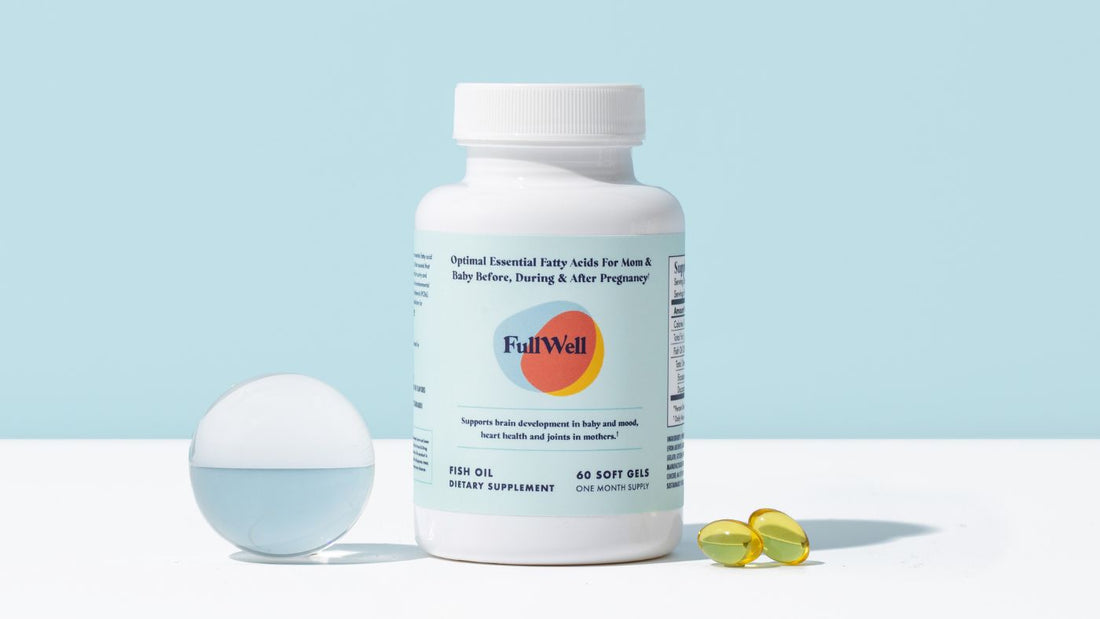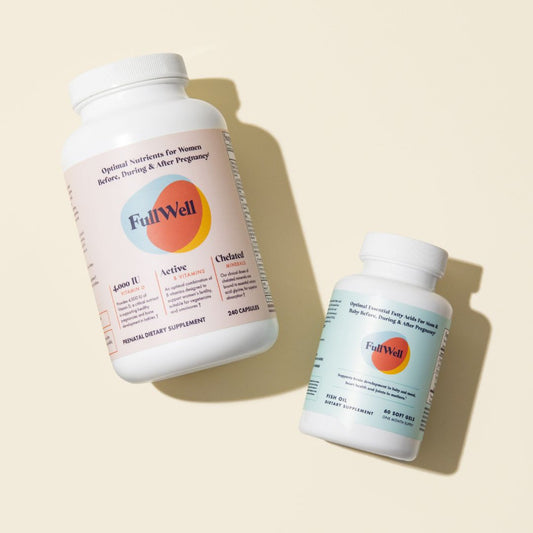Protecting Your Pregnancy with Nicole Luke, APD, AN
Read more

We couldn’t be happier with our ultra-fresh, highly sustainable fish oil supplements for both men and women. Customer feedback has been excellent, and - like with the launch of our other products - all of that support comes with an influx of highly intellectually curious (read: super bright) questions from you.
So, we thought we’d take a moment this week to dive into some of the most frequently asked questions we get not just about our fish oil but about fish oil in general, the benefits of Omega-3s, and how to go about making sure you are nutritionally covered with the supplements you need during preconception, pregnancy, and postpartum.
(If you’re looking for something to listen to, our Founder, Ayla Barmmer MS, RD, LDN, took to Instagram to tell the dramatic, triumphant origin story of FullWell Fish Oil, answering customer questions in real-time. If you have a moment, it’s worth checking out!)
So now we get to the facts, and when it comes to the questions we get about fish oil, they fall into three categories: fish oil benefits, our fish oil benefits, and how to use them.
Omega-3 fatty acid needs are higher in pregnancy than in other periods of life because moms are the primary source for developing babies. Research shows that consuming Omega-3s during pregnancy can increase the length of pregnancy and birth weight by altering the balance of eicosanoids involved in labor, promoting fetal growth by improving placental blood flow (1).*
Ideally, you’ll want to build up stores before trying to conceive. Studies show that 80% of U.S. women of childbearing age have low levels of Omega-3 fatty acids for various reasons - diet, genetics, and chronic illness, to name a few (2). Because moms are their baby’s primary source of EPA and DHA, getting enough before, during, and after pregnancy is essential. EPA and DHA promote a happy and healthy pregnancy, support fetal and newborn development, and offer much-needed mood and immune support for moms in the postpartum period.*
Take with or without food or your prenatal, any time of day. You read that right: YES, it can be taken at the same time as your prenatal without any negative impact on absorption. It also can be taken separately, with or without food, or as recommended by your healthcare provider.
Yes! Omega-3 fatty acids are essential for both female and male fertility. *For men, a higher intake of omega-3s is positively related to sperm morphology and concentration (3, 4). *Our Balanced Omegas are the perfect choice!
EPA and DHA play different roles. Much of the research supporting DHA in pregnancy and lactation is related to baby’s brain and early visual development.* However, newer research shows that EPA is necessary to help DHA pass through the placenta for baby to utilize.* FullWell Fish Oil achieves that balance in only two gel caps daily. Moreover, both DHA and EPA coexist in nature, and research supports the importance of combining these fatty acids rather than isolating just DHA (1).
FullWell Fish Oil contains an optimal essential fatty acid profile with a daily serving size of 100mg of EPA and 500mg of DHA.
Try taking fish oil with a high-fat meal. It may improve the bioavailability of Omega-3 fatty acids and increase tolerance (5).
The short answer is yes! If you are still breastfeeding, your nutrient needs for Omega-3 fatty acids are higher for you and your baby.* Studies show that higher levels of DHA in breast milk are easily absorbed by babies and raise their DHA levels.* So optimal amounts of DHA and EPA mean that you have sufficient levels for your health and recovery during the postpartum period and baby's growing needs.* At birth, the average baby's brain is about a quarter of the size of the average adult brain, so getting enough Omega-3s can help support baby’s brain development during those early months and years.*
Yes! Evidence shows that Omega-3s help with mood, especially during the postpartum period.* Omega-3s have also been researched to show benefits for heart health, immune and inflammatory responses, metabolism, skin, hair, nervous system, joints, eyes, and brain health.*
FullWell Fish Oil contains an optimal essential fatty acid profile with a daily serving size of 100mg of EPA and 500mg of DHA.
The safety and quality of our products is our top priority, but you know that. Every ingredient we use is tested for identity and contaminants before it is accepted for use in our product. The final product is then tested in a cGMP-certified facility and then tested again by an independent, 3rd party lab. Throughout the process, our product has complete oversight from our quality control team.
One important testing factor in fish oil is oxidation (or Total Oxidation Value). When fish oil starts to oxidize, the levels of EPA and DHA decrease and break down into more minor compounds called free radicals. These free radicals cause oxidative stress, rendering the product ineffective. Freshness is paramount when it comes to a fish oil supplement. FullWell Fish Oil has some of the lowest oxidation scores in the industry, which means the freshest possible product without an aftertaste.
Of course! Our EPA + DHA are GMO-free.
We third-party test each batch through a reputable, certified lab to ensure that mercury and all other heavy metals, dioxins, and polychlorinated biphenyls (PCBs) are below detectable levels. This is a non-negotiable on every batch to ensure quality and safety.
FullWell Fish Oil is made without soy, corn, nuts, dairy, wheat, gluten, rice, sweeteners, artificial colors, or flavors but should not be taken by those with a seafood allergy. Consult your physician if you are allergic to iodine or are taking blood thinner medications. If you have a fish allergy, speak with your healthcare provider before taking FullWell Fish Oil.
This supplement is made from sustainably sourced, wild-caught fish off the coast of Peru. We are Friend of the Sea Certified to ensure that the fish used to produce our oil come from ethical fisheries using sustainable practices.
Sadly, no. Our fish oil is ethically and sustainably sourced and delivered in a bovine-derived gelatin capsule. While vegan essential fatty acid products are available, we chose to utilize this natural fish oil from a trusted and highly vetted source due to its superior bioavailability.
The serving size is two small, easy-to-swallow gel caps. That's it!
Each bottle contains 60 gel caps, giving you a one-month supply.
Our Fish Oil has a two-year shelf life, and you can peek at the expiration date on the bottom of the bottle.
Store your fish oil in a cool, dark place. FullWell Fish oil is highly stable, but heat and light degrade it over time like all fresh fish oil products. If you live in a climate that experiences extremely high temperatures, you can consider storing your bottle in the refrigerator over prolonged bouts of heat, but it isn’t necessary. Our bottles (and the protective capsules within) are so effective at protecting this liquid gold that it isn’t required to ship this product on ice, even in hot climates. However, extended exposure - e.g., leaving it outside in really high temperatures - will inevitably get to it, so keep an eye on your tracking information and retrieve your package from any outdoor destinations within 24 hours of delivery.
Discuss that with your healthcare provider! FullWell Fish Oil can generally be taken along with your medication, but you should always consult with your provider before taking any new supplements. If you are taking blood thinning medications, use caution, as fish oil may decrease platelet activity.
Taking very high doses in the final weeks and days before giving birth may risk thinning your blood and contributing to excessive bleeding during delivery or postpartum. However, the amounts included in FullWell Fish Oil are unlikely to cause this. If you have concerns and are increasing the dose beyond the serving size, you can consider stopping temporarily or reducing the amount between 36-38 weeks until after birth.
